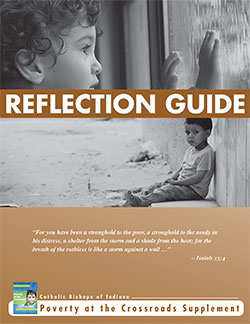Poverty pastoral reflection guide aims to help people grow in faith
By Sean Gallagher
 Lent is a season when many Catholics seek to enter more deeply into their faith. Parishes often respond to this desire by offering adult faith formation sessions in the weeks leading up to Easter.
Lent is a season when many Catholics seek to enter more deeply into their faith. Parishes often respond to this desire by offering adult faith formation sessions in the weeks leading up to Easter.
During this Lent in the Holy Year of Mercy, Catholics across central and southern Indiana from middle-school age through adults can learn more about the Church’s teaching on helping those in need and its spiritual meaning by studying “Poverty at the Crossroads: The Church’s Responses to Poverty in Indiana,” a pastoral letter issued by the five bishops of Indiana last March.
A reflection guide to the pastoral letter developed by archdiocesan leaders is available at www.archindy.org/holyyearofmercy.
“We feel like this could be a resource that could be used far and wide,” said Ken Ogorek, archdiocesan director of catechesis. “And we believe that people as young as junior high could make great use of this resource for learning, discussion and faith sharing.”
Theresa Chamblee, archdiocesan director of Catholic Relief Services and the Catholic Campaign for Human Development, said the guide can help clear up “misconceptions” about the Church’s teaching on poverty.
“We always hear about the poor in the Scriptures,” Chamblee said. “And our pope and many Church leaders refer to the poor. But this provides a little bit more depth into our Church teaching, and the beauty of it around love for the poor and most vulnerable.”
To provide that depth, the guide also offers users excerpts from Pope Francis’ apostolic exhortation, “The Joy of the Gospel,” his bull of indiction that announced the Holy Year of Mercy, and a report on poverty in Indiana developed by the United Way.
Chamblee said these additional readings give the pastoral letter “a broader base.”
“This goes a little deeper,” she said. “This is more of a spiritual reflection about why the two great commandments to love God and our neighbor are so important.”
While the five sessions of the reflection guide fit well within Lent, the guide can be used at any time of the year.
The study sessions, which can take place in groups in parishes, schools or other settings, or by individuals, involve an opening prayer, a Scripture reflection and questions about the readings from the pastoral letter and other sources assigned to that session.
Users are encouraged to submit answers to questions in the reflection guide in bold to reducepoverty@archindy.org. This will help archdiocesan leaders gain a more complete understanding of poverty as it exists in various parts of central and southern Indiana.
The reflection guide ends with an opportunity for users to make a personal commitment to take action to help people suffering from poverty in the state.
“Every single one of us has to make a commitment—whether it’s through prayer, action within the community, educating those around us,” Chamblee said. “All of us have a call to live out our faith.”
Ogorek said that the reflection guide could help the pastoral letter have a greater impact on the fight against poverty in the state, and in the faith life of Catholics across central and southern Indiana.
“Oftentimes, documents like pastoral letters make an initial splash and then they sit on a shelf,” Ogorek said. “I know that Archbishop [Joseph W.] Tobin’s fond hope is that this reflection guide will be a great motivation for people to make the poverty pastoral more of a living document.” †
